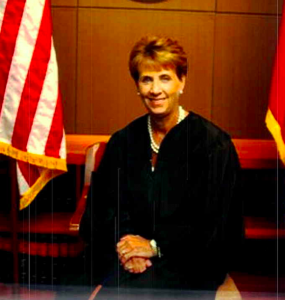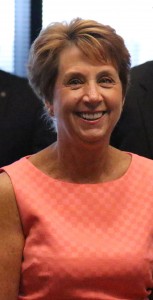Susan Forsling's Next Chapter at Miles Mediation
Mon, Jun 1st, 2015 | by Miles Mediation and Arbitration | Get to Know our Neutrals | Social Share
Written By Jamie Miles
I love talking to people, learning their stories. Every now and then, I meet someone whose story not only impresses me – it inspires me. And then she turns out to such a nice person.
Darn. They’re just about perfect. I might have to start stalking her till we become besties.
Susan Forsling is that kind of person. The newest mediator at Miles has a wonderful story – and it’s far from over. She’s just starting another chapter.
Over the phone recently, Susan said this was a “decade birthday year” for her in August. As I’ve had a few decade birthdays myself, I commented on how young she is considering all that she’s accomplished in her career.
Susan replied with a laugh, “I’m not old. I’ve just been younger than you a bit longer.”
Here’s a quick look at this driven legal professional.
Raised in a suburb of Baltimore, by Susan’s admission, “I was a busy, busy girl.” With a working mom and dad who travelled, Susan and her sister “learned to be very independent and self-sufficient.”
While completing her undergraduate work at prestigious Keynon College in Ohio, she supplemented scholarship money and money her father borrowed by working three jobs. She laughed, “I’ve held one to three jobs, since I was 16 years old.”
After college, Susan entered the University of Georgia School of Law. There she met husband Mark. After graduating in 1982, Mark clerked then joined the firm he has been with throughout his career as an expert in land use law.
Susan started her legal career by forming a firm and one of their clients was the Fulton County government.
“I was the first female attorney Fulton County hired. Then I started the Fulton County in house office. I worked my way up and was appointed Fulton County Attorney in 1992.”
What does one do as county attorney?
“As the Fulton County Attorney, I was the chief legal officer for the government of Fulton County. I was in charge of the entire law department, including the transaction side, the policy side, the litigation side. The hard part of the job was that I had seven bosses. Republicans, Democrats, male, female, black and white.
On any given day with four votes, they could fire me. I had that job for a little over six years until I went on the bench. That was the job that best prepared me for the bench. Not only because of the diversity of issues I addressed but also the temperament one has to develop to be the lawyer for seven elected officials.”
What were the big issues you worked with as Fulton County Attorney during that time, 1992 – 1997?
“The Olympics. I did all the legal work at that time working with other lawyers.
Other issues were: tax code issues, Grady, zoning. Not to mention any issues that come up in a large corporation. Human resources issues, employment issues. Fulton County was really booming. North Fulton was taking off.
I loved it. I would joke with people whatever was on the front page of the Metro/State section of the paper was what I would be going doing that day. You never knew.
It was a fun job but it was a 14-hour a day job. I had two small children (Brad now 30 and Leslie, 28) and it really took its toll on me. It would take its toll on anybody.
It was tough, tough. When the governor appointed me, Mark said, ‘I’m going to write him a letter and thank him that I get my wife back.’”
When and how did your appointment to the bench happen?
“I tried five times with two governors before I got appointed. I was always the bridesmaid, never the bride. Governor Miller called and said, ‘Susan, your perseverance is paying off. I’m going to appoint you.’ The AJC writer wrote the headline, ‘Forsling Finally Gets It,’” she laughed. But also added, “It got discouraging. It was very much a growth time. (With her faith.) Those were tough years.”
Once on the bench, Forsling took on the task of creating a DUI Accountability Court based on a national model.
“The thing I’m most proud about was an accountability court for repeat DUI offenders. We began in 2007 with people who had multiple DUIs. Instead of putting them in jail, we put them through a outpatient rehab program. We’d monitor them closely. I’d see them every other week and try to break that cycle. That was the most rewarding thing I was able to do on the bench.
The lives that were transformed. The families that were transformed. It was amazing what a little accountability will do.”
The highlights of her judicial career:
“Aside from creating the accountability court, it would be presiding over the trials — the civil jury trials. I loved to try cases as a judge and as a lawyer. I loved watching the lawyers work and interact with juries. The legal issues that would come up. The evidence issues. I just loved all that.”
Now that Susan mediates full time, I wondered her impressions on the differences of issue resolution in the courts verses mediation.
“Adversarial verses conciliatory. Once you get in the courtroom, you at the peak of a professional adversarial situation (not personal).
Another huge difference is the judge and the jury are in control. The parties have lost control of the outcome. The judge makes evidence decisions and the judge charges on the law, and the jury ultimately is going to make the decision. So it leaves your hands and goes into the hands of third parties.
I tell people in mediation this is the only day that everybody in the case is going to be on the same page with the same goal.”
Any thoughts on the future of mediation?
“Alternate dispute resolution is here to stay because litigation has become so expensive and so time consuming. It’s integral now in the culture of our legal system. “ She thought that smaller jurisdictions outside the metro area will have to gain better understanding of mediation and have good mediators available.
Although Susan mediates full time, she also sits as a senior judge. Remember she has always held two jobs since she was 16. She described it to me in layman’s terms. “It’s like a substitute teacher. I can sit as a substitute judge in state court or superior court anywhere in the state.” She added with a laugh, “You know what happens when a substitute teacher comes in.”
Which got me wondering? Having been intimately connected with so many facets of the legal profession, is there something different when you walk into the courtroom wearing the robe?
“No question. It’s an incredible responsibility and privilege and when you put that robe on. You assume the role. You assume that demeanor. And you assume the responsibility.
It’s a tremendous privilege but it’s a great responsibility to treat everybody fairly and make really good decisions. I still bring my personality to the courtroom. I don’t check that at the door. But that sense of responsibility weighs heavily as soon as the robe goes on. And I welcome that, I really do.”
When we spoke, Susan was set to fly to Thailand for the fifth time on a missionary trip. She’s also been to Africa four times.
“We have a team. My responsibility is prison ministry particularly women in prison. To have a judge who comes over there to tell them they have a future and they are loved — that there is grace and mercy for them. They have never heard that.
God did not put me here to be quiet. I go and deliver a message of hope.”
For such a vibrant person with all her varied life experiences, I wondered what does she plan in the future or does she take one day at time?
I do both. God calls us to take one day at time and not to worry about tomorrow because tomorrow has it’s own problems.
But I’m a builder, I realized that when I started to reflect on my career.
I literally lost my job right when I got back from my honeymoon. I built a small law firm with two other partners. Then I built the in house office. Then I built the DUI court. And now I’m building a mediation practice and at some point I hope to build a team. I know for me to be happy I have to have my next building project.”
For now at Miles, Susan’s mediation practice is in all areas of civil mediation including complex civil.
It’s easy to become excited spending 30 minutes chatting with an inspirational person such as Susan Forsling. When I mentioned that to her at the end of our conversation and she laughed saying,
“I don’t think of myself that way. I just think of myself as busy. And happy.”



